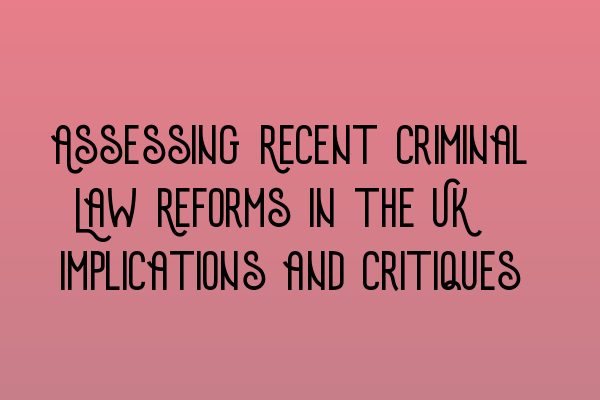Assessing Recent Criminal Law Reforms in the UK: Implications and Critiques
The criminal justice system forms the backbone of any society, ensuring the maintenance of law and order. However, with the ever-evolving nature of crime, it is crucial for legislative reforms to keep pace with societal changes. In the United Kingdom, recent criminal law reforms have been implemented to address emerging issues and enhance the effectiveness of the system. This article aims to assess these reforms, evaluate their implications, and examine the critiques surrounding them.
Overview of Criminal Law Reforms
The criminal law reforms in the UK encompass various aspects, such as procedural changes, new legislation, sentencing guidelines, and technological advancements. One significant reform is the introduction of the Solicitors Qualifying Examination (SQE) by the Solicitors Regulation Authority (SRA). SQE Criminal Law & Practice Law UK provides comprehensive training and preparation courses for aspiring solicitors.
SQE 1 Preparation Courses and SQE 2 Preparation Courses play a crucial role in equipping future legal professionals with the necessary knowledge and skills to navigate the complexities of criminal law.
Implications of Criminal Law Reforms
The recent criminal law reforms have had both positive and negative implications. One significant positive impact is the streamlining of the qualification process for solicitors through the SQE. This reform ensures that solicitors possess the requisite competence and expertise in criminal law, enhancing the overall quality of legal services provided to the public.
Moreover, the introduction of new legislation has helped address specific legal loopholes and gaps in the criminal justice system. This enables law enforcement agencies to effectively combat emerging forms of crime, such as cybercrime and terrorism.
On the other hand, some critics argue that certain reforms have led to an over-reliance on technology, potentially compromising the principles of justice. While technology can expedite processes and improve efficiency, it should not overshadow the importance of human judgment and discretion in criminal law proceedings.
Critiques of Criminal Law Reforms
Despite the positive implications, criminal law reforms in the UK have also faced several critiques. One aspect of criticism is the potential impact on access to justice. Critics argue that certain reforms, such as cuts in legal aid and changes to eligibility criteria, have limited the availability of legal representation for vulnerable individuals and marginalized communities.
Another critique revolves around the sentencing reforms, which some argue have resulted in inconsistent and disproportionate punishments. The use of mandatory minimum sentences has come under scrutiny for disregarding individual circumstances and hindering judicial discretion.
Furthermore, the introduction of technology in criminal law proceedings has raised concerns regarding data privacy and security. As digital evidence becomes increasingly prevalent, there is a need for robust safeguards to protect individuals’ rights and prevent misuse of sensitive information.
Conclusion
The recent criminal law reforms in the UK reflect the constant need to adapt to evolving challenges and enhance the effectiveness of the justice system. While these reforms have brought about positive changes, such as streamlining the qualification process and addressing new forms of crime, they are not without their critiques. It is essential to consider and address these critiques to ensure the fair and equitable administration of justice.
For aspiring solicitors, SQE 1 Practice Exam Questions and SQE 1 Practice Mocks FLK1 FLK2 can serve as valuable resources to enhance exam preparation and ensure success in the SQE Criminal Law & Practice Law UK.
Stay updated with the latest SRA SQE Exam Dates to plan your legal career journey effectively.
